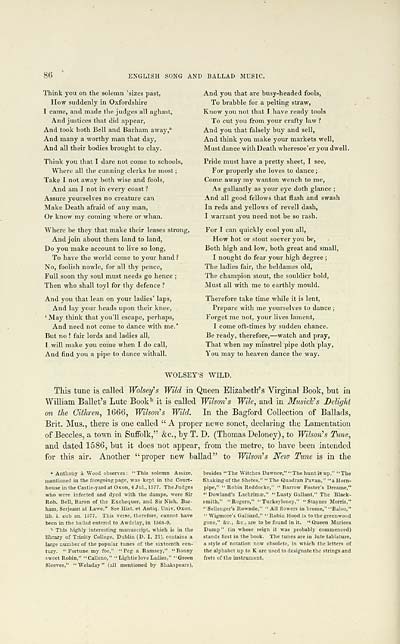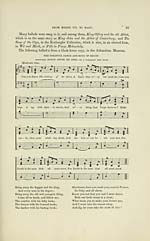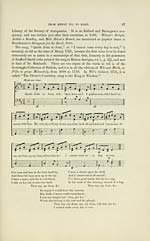Glen Collection of printed music > Printed text > Popular music of the olden time > Volume 1
(120) Page 86 - Wolsey's wild
Download files
Complete book:
Individual page:
Thumbnail gallery: Grid view | List view

86
ENGLISH SONG AND BALLAD MUSIC.
Think you on the solemn 'sizes past,
How suddenly in Oxfordshire
I came, and made the judges all aghast,
And justices that did appear.
And took both Bell and Barham away,"
And many a worthy man that day,
And all their bodies brought to clay.
Think you that I dare not come to schools,
Where all the cunning clerks be most ;
Take I not away both wise and fools,
And am I not in every coast ?
Assure yourselves no creature can
Make Death afraid of any man.
Or know my coming where or whan.
Where be they that make their leases strong,
And join about them land to land.
Do you make account to live so long,
To have the world come to your hand ?
No, foolish nowle, for all thy pence,
Full soon thy soul must needs go hence ;
Then who shall toyl for thy defence ?
And you that lean on your ladies' laps.
And lay your heads upon their knee,
' May think that you'll escape, perhaps,
And need not come to dance with me.'
But no ! fair lords and ladies all,
I will make you come when I do call.
And find you a pipe to dance withall.
And you that are busy-headed fools.
To brabble for a pelting straw.
Know you not that I have ready tools
To cut you from your crafty law ?
And you that falsely buy and sell.
And think you make your markets well,
Must dance with Death wheresoe'eryou dwell.
Pride must have a pretty sheet, I see.
For properly she loves to dance ;
Come away my wanton wench to me,
As gallantly as your eye doth glance ;
And all good fellows that flash and swash
In reds and yellows of revell dash,
I warrant you need not be so rash.
For I can quickly cool you all,
How hot or stout soever you be.
Both high and low, both great and small,
I nought do fear your high degree ;
The ladies fair, the beldames old.
The champion stout, the souldier bold,
Must all with me to earthly mould.
Therefore take time while it is lent,
Prepare with me yourselves to dance ;
Forget me not, your lives lament,
I come oft-times by sudden chance.
Be ready, therefore, — watch and pray,
That when my minstrel pipe doth play.
You may to heaven dance the way.
WOLSEY'S WILD.
This tune is called Wolsey^s Wild in Queen Elizabeth's Virginal Book, but in
William Ballet's Lute Book'' it is called Wilson'' s Wile, and in MusiclUs Delight
on the Cithren, 1666, Wilson^s Wild. In the Bagford Collection of Ballads,
Brit. Mus., there is one called " A proper newe sonet, declaring the Lamentation
of Beccles, a town in Suffolk," &c., by T. D. (Thomas Deloney), to Wilson^s Tune,
and dated 1586, but it does not appear, from the metre, to have been intended
for this air. Another "proper new ballad" to Wilson'' s Neiv Tune is in the
» Anthony t Wood observes: *'This solemn Assize,
mentioned in the foregoing page, was liept in the Court-
house in the Castle-yard at Oxon, 4 Jul., 1577. The Judges
who were infected and dyed mth the danipe, were Sir
Rob. Bell, Baron of the Exchequer, and Sir Nich. Bar-
ham, Seijeant at Lawe." See Hist, et Antiq. Univ. Oxon.
lib. i. sub an. 1577. This verse, therefore, cannot have
been in the ballad entered to Awdelay, in 1568-9.
^ This highly interesting manuscript, which is in the
library of Trinity College, Dublin (D. I. 21), contains a
large number of the popular tunes of the sixteenth cen-
tury. "Fortune my foe," "Peg a Ramsey," "Bonny
sweet Robin," "Calleno, " "Lightie love Ladies," "Green
Sleeves," " Weladay " (all mentioned by Shakspeare),
besides " The Witches Dawnce," "The hunt is up," "The
Shaking of the Shetes," "The Quadran Pavan," "aHom-
pipe," " Robin Reddocke," "Barrow Foster's Dreame,"
" Dowland's LachrimEe," "Lusty Gallant," The Black-
smith," "Rogero," " Turkeyloney," "Staynes Morris,"
"Sellenger's Rownde," " All flowers in brome," "Baloo,"
" Wigmore's Galliard," "Robiu Hood is to the greenwood
gone," &c., &c.,are to be found in it. "Queen Mariees
Dump" (in whose reign it was probably commenced)
stands first in the book. The tunes are in lute tablature,
a style of notation now obsolete, in which the letters of
the alphabet up to K are used to designate the strings and
frets of the instrument.
ENGLISH SONG AND BALLAD MUSIC.
Think you on the solemn 'sizes past,
How suddenly in Oxfordshire
I came, and made the judges all aghast,
And justices that did appear.
And took both Bell and Barham away,"
And many a worthy man that day,
And all their bodies brought to clay.
Think you that I dare not come to schools,
Where all the cunning clerks be most ;
Take I not away both wise and fools,
And am I not in every coast ?
Assure yourselves no creature can
Make Death afraid of any man.
Or know my coming where or whan.
Where be they that make their leases strong,
And join about them land to land.
Do you make account to live so long,
To have the world come to your hand ?
No, foolish nowle, for all thy pence,
Full soon thy soul must needs go hence ;
Then who shall toyl for thy defence ?
And you that lean on your ladies' laps.
And lay your heads upon their knee,
' May think that you'll escape, perhaps,
And need not come to dance with me.'
But no ! fair lords and ladies all,
I will make you come when I do call.
And find you a pipe to dance withall.
And you that are busy-headed fools.
To brabble for a pelting straw.
Know you not that I have ready tools
To cut you from your crafty law ?
And you that falsely buy and sell.
And think you make your markets well,
Must dance with Death wheresoe'eryou dwell.
Pride must have a pretty sheet, I see.
For properly she loves to dance ;
Come away my wanton wench to me,
As gallantly as your eye doth glance ;
And all good fellows that flash and swash
In reds and yellows of revell dash,
I warrant you need not be so rash.
For I can quickly cool you all,
How hot or stout soever you be.
Both high and low, both great and small,
I nought do fear your high degree ;
The ladies fair, the beldames old.
The champion stout, the souldier bold,
Must all with me to earthly mould.
Therefore take time while it is lent,
Prepare with me yourselves to dance ;
Forget me not, your lives lament,
I come oft-times by sudden chance.
Be ready, therefore, — watch and pray,
That when my minstrel pipe doth play.
You may to heaven dance the way.
WOLSEY'S WILD.
This tune is called Wolsey^s Wild in Queen Elizabeth's Virginal Book, but in
William Ballet's Lute Book'' it is called Wilson'' s Wile, and in MusiclUs Delight
on the Cithren, 1666, Wilson^s Wild. In the Bagford Collection of Ballads,
Brit. Mus., there is one called " A proper newe sonet, declaring the Lamentation
of Beccles, a town in Suffolk," &c., by T. D. (Thomas Deloney), to Wilson^s Tune,
and dated 1586, but it does not appear, from the metre, to have been intended
for this air. Another "proper new ballad" to Wilson'' s Neiv Tune is in the
» Anthony t Wood observes: *'This solemn Assize,
mentioned in the foregoing page, was liept in the Court-
house in the Castle-yard at Oxon, 4 Jul., 1577. The Judges
who were infected and dyed mth the danipe, were Sir
Rob. Bell, Baron of the Exchequer, and Sir Nich. Bar-
ham, Seijeant at Lawe." See Hist, et Antiq. Univ. Oxon.
lib. i. sub an. 1577. This verse, therefore, cannot have
been in the ballad entered to Awdelay, in 1568-9.
^ This highly interesting manuscript, which is in the
library of Trinity College, Dublin (D. I. 21), contains a
large number of the popular tunes of the sixteenth cen-
tury. "Fortune my foe," "Peg a Ramsey," "Bonny
sweet Robin," "Calleno, " "Lightie love Ladies," "Green
Sleeves," " Weladay " (all mentioned by Shakspeare),
besides " The Witches Dawnce," "The hunt is up," "The
Shaking of the Shetes," "The Quadran Pavan," "aHom-
pipe," " Robin Reddocke," "Barrow Foster's Dreame,"
" Dowland's LachrimEe," "Lusty Gallant," The Black-
smith," "Rogero," " Turkeyloney," "Staynes Morris,"
"Sellenger's Rownde," " All flowers in brome," "Baloo,"
" Wigmore's Galliard," "Robiu Hood is to the greenwood
gone," &c., &c.,are to be found in it. "Queen Mariees
Dump" (in whose reign it was probably commenced)
stands first in the book. The tunes are in lute tablature,
a style of notation now obsolete, in which the letters of
the alphabet up to K are used to designate the strings and
frets of the instrument.
Set display mode to: Large image | Transcription
Images and transcriptions on this page, including medium image downloads, may be used under the Creative Commons Attribution 4.0 International Licence unless otherwise stated. ![]()
| Special collections of printed music > Glen Collection of printed music > Printed text > Popular music of the olden time > Volume 1 > (120) Page 86 - Wolsey's wild |
|---|
| Permanent URL | https://digital.nls.uk/91368887 |
|---|
| Shelfmark | Glen.254 |
|---|---|
| Additional NLS resources: | |
| Attribution and copyright: |
|
| Description | Scottish songs and music of the 18th and early 19th centuries, including music for the Highland bagpipe. These are selected items from the collection of John Glen (1833 to 1904). Also includes a few manuscripts, some treatises, and other books on the subject. |
|---|
| Description | The Glen Collection and the Inglis Collection represent mainly 18th and 19th century Scottish music, including Scottish songs. The collections of Berlioz and Verdi collected by bibliographer Cecil Hopkinson contain contemporary and later editions of the works of the two composers Berlioz and Verdi. |
|---|

